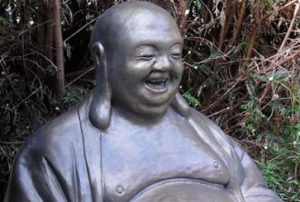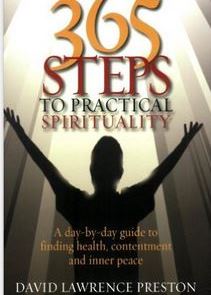I was first attracted to Buddhism because it seemed to me to be more eco-friendly than other traditions. It seemed more enlightened than Christianity, Islam and Judaism! But recent investigations have made me wonder if this is really true as we shall see.
In ancient times when the world’s major religions were created they had no notion that the life support systems of our home planet could be destroyed by human activity. But we now have a global view and we have seen what bad stewardship by humans can accomplish – overpopulation, polluted seas and atmosphere, global warming, deforestation, soil erosion, animal, fish and bird species dying off at an alarming rate to mention just a few.
In Biblical times animal sacrifices were considered desirable as a means of pleasing the deities, and the Roman rulers murdered living creatures for entertainment. It is said that on one day alone 70,000 animals were slaughtered in the Colosseum just for the spectacle. They had no notion that entire species such as lions and tigers could one day be threatened with extinction forever.
We simply can’t interpret 2,500 year-old ideas in the light of 21st Century knowledge and priorities.
Ethical attitudes and the place of animals
In principle Buddhist attitudes to the natural world are very clear. The First Buddhist Precept states ‘I undertake to refrain from harming living beings. Abstaining from violence is a requirement of the Eight Fold Path incorporating Right Action and Right Livelihood. A modern interpretation by Thich Nhat Hahn (in his ‘Order of Inter-being’) includes:
- 11th Precept: Do not live with a vocation that is harmful to humans or nature.
- 12th Precept: Do not kill. Do not let others kill.
Could that be any clearer? No harming, no violence, no butchering or hunting. No profiting from destructive and cruel activities. Non-violence towards all beings and the planet.
Should animals be considered as equal worth as humans? Other religions also have strong views on this. The Hebrew Scriptures (OT) tells us that God granted humans stewardship over the Earth and all living creatures. Does this mean we have divine permission to exploit them?
Not in Buddhism. Buddhism says we should respect all sentient beings. Fair enough, but what is a sentient being? Elephants, dolphins, horses, sheep, fish, birds and so on for sure. But how about insects, bacteria, single cell life and viruses – does the First Precept apply equally to them? Clearly not.
It is complicated in Buddhism by the belief that there is a possibility of being reincarnated as an animal and maybe having been animals in previous lives. How could we harm a creature that may once have been our mother?
In my opinion all creatures have just as much right to a dignified and cruelty-free life in their own natural environment as we do and Buddhism seems to agree. Good karma arises from taking care of vegetation, waterways, forests and minerals too. Caring for the planet, not exploiting it indiscriminately is a good thing. And so it should be.
A hierarchical world
Even so, like other religions, Buddhism assumes a clear hierarchical structure. Humans are central to Buddhist teachings. Its goal is to encourage advancement towards personal enlightenment. So humans are above the animals. The idea that all beings are of equal worth and interdependent is not a prime motivator, although there is ‘merit’ in taking care of the natural world.
For me it is disappointing that the welfare of some species considered more important than others. For instance, when a bullfighter gets injured in the ring, who do I feel sorry for? The bull, naturally.
How the Four Main Virtues relate to animals and the natural world
The Four Main Virtues in Buddhism are:
- Loving kindness
- Compassion
- Joy
- Equanimity
With respect to the natural world they raise a number of questions, such as:
- Is it OK to cull some animals (e.g. badgers, foxes, seals) to protect perceived human interests?
- Is killing a whale, elephant or lion worse than killing a dog, snake or hedgehog?
- Is it loving kindness to destroy an animal’s natural habitat (e.g. by cutting down trees and draining marshes) so that it becomes extinct?
- Where’s the compassion in removing a calf from its mother, stealing her milk and then slaughtering the young? Or in keeping a calf in a tiny pen so it can’t move, and feeding it on an unnatural milk-based diet to make its flesh white for the veal industry?
- Is it OK to placing a hen in a cage and steal her eggs?
- Can we stand back with equanimity as human activity destroys the natural .environment?
Our current relationship with the natural world is often bereft of loving kindness, compassion, joy and equanimity. It is highly exploitative and far from harmonious!
Plant life and the environment
Some Buddhist texts forbid causing injury to seeds, crops and vegetation and state that there is merit in planting trees, herbs and other plants. But is this because plant life has worth in itself, or because it is offers utility to humanity, for instance, trees provide shelter, beauty, fruit and timber?
Buddhism is equivocal on whether plants are sentient or non-sentient beings, therefore deserving of the same respect as the higher animals. Even so many Buddhists see living in or close to nature as beneficial (the Buddha himself lived in the forest). And so it is. Humans need sunlight, natural earth resonances and fresh oxygen to thrive.
Again, while the natural world is not the prime objective of good environmental practices, at least it in an indirect beneficiary and we should all be thankful for that.
Vegetarianism and veganism
Buddhist principles strongly suggest a vegetarian or vegan lifestyle, but this isn’t followed by all Buddhists. Some say it is alright to eat meat providing you have not knowingly had it killed for you, so, for instance, monks are permitted to eat meat provided they were not complicit in its killing.
On the one hand there are those among Buddhists and the general population who argue that eating meat is natural and healthy and eating is essential to control certain animal populations.
On the other hand, others say (as I do) that rearing animals for meat is uneconomic and wasteful, destroys the balance of nature, damages the environment (e.g. methane), causes suffering to living creatures, and is unnecessary for human health.
So why is it OK in my country to eat a sheep or a pig, but not a dog or cat? And if we are unwilling to kill are we willing to let others kill on our behalf? Could you kill a cow or a sheep and chop it up for food? Moreover, is it acceptable to use animal products without killing, e.g. milk, eggs, honey. How cruel are we allowed to be? And what about the by-products of the meat industry – leather, gelatine etc.
Once again, Buddhist principles seem clear, while practice does not.
Animal experiments
Is it acceptable or justified to subject a living creature to suffering and probably premature death on the off chance of relieving suffering and illness in human beings.
Conclusion
We are the only animal stupid enough to deliberately destroy the very life support systems of the planet that nourishes us. But they didn’t know that in the Buddha’s day.
Nowadays one of the most pressing questions for humanity is ‘How do we create a lifestyle for all than benefits all creatures in the long term and is sustainable?
Self-restraint, the notion that only if everyone voluntarily restricts the demands they make on the planet can it be saved, is the key but seems to be impossible in capitalist societies (and I include China). It is very much in line with mainstream Buddhist thinking – but not necessarily followed by all Buddhists.
But there are tensions in Buddhism between the pursuit of individual advancement and environmental concerns. There is no assumption in Buddhism that humans are part of nature and Buddhist virtues such as loving kindness and non-violence are not always extended to the natural world.
That’s not just a pity – it’s a matter of long term survival of all species. Including us.
©David Lawrence Preston, 21 Oct 2017
Follow me on Facebook and Twitter
How to Books, 2007




Leave a Reply